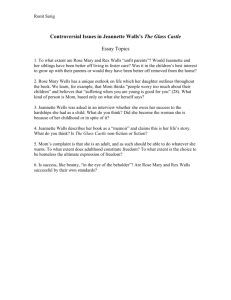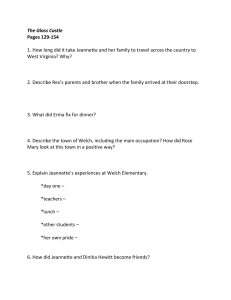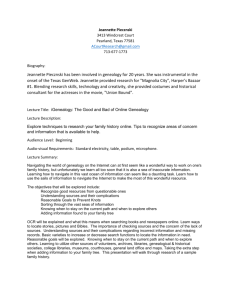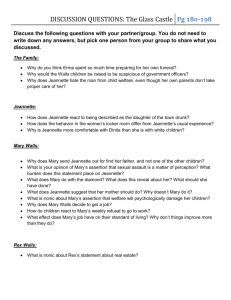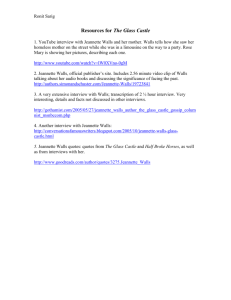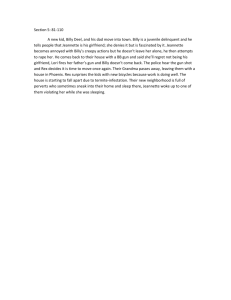The Glass Castle - Symbols/Metaphors/Themes Symbols
advertisement
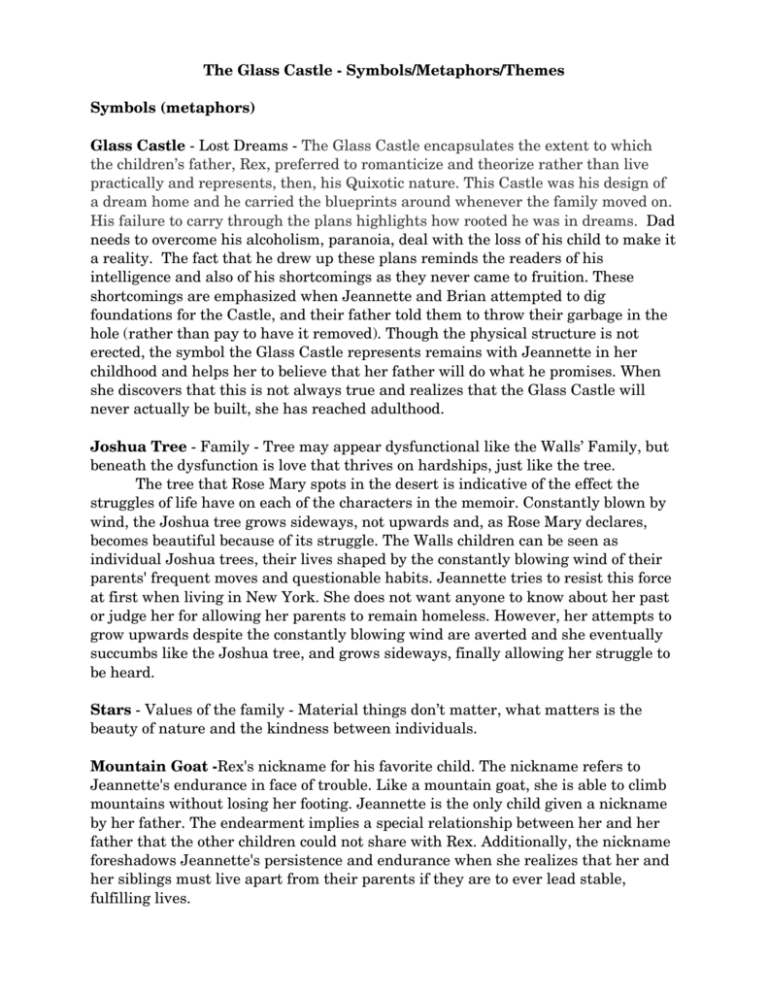
The Glass Castle - Symbols/Metaphors/Themes Symbols (metaphors) Glass Castle - Lost Dreams - The Glass Castle encapsulates the extent to which the children’s father, Rex, preferred to romanticize and theorize rather than live practically and represents, then, his Quixotic nature. This Castle was his design of a dream home and he carried the blueprints around whenever the family moved on. His failure to carry through the plans highlights how rooted he was in dreams. Dad needs to overcome his alcoholism, paranoia, deal with the loss of his child to make it a reality. The fact that he drew up these plans reminds the readers of his intelligence and also of his shortcomings as they never came to fruition. These shortcomings are emphasized when Jeannette and Brian attempted to dig foundations for the Castle, and their father told them to throw their garbage in the hole (rather than pay to have it removed). Though the physical structure is not erected, the symbol the Glass Castle represents remains with Jeannette in her childhood and helps her to believe that her father will do what he promises. When she discovers that this is not always true and realizes that the Glass Castle will never actually be built, she has reached adulthood. Joshua Tree - Family - Tree may appear dysfunctional like the Walls’ Family, but beneath the dysfunction is love that thrives on hardships, just like the tree. The tree that Rose Mary spots in the desert is indicative of the effect the struggles of life have on each of the characters in the memoir. Constantly blown by wind, the Joshua tree grows sideways, not upwards and, as Rose Mary declares, becomes beautiful because of its struggle. The Walls children can be seen as individual Joshua trees, their lives shaped by the constantly blowing wind of their parents' frequent moves and questionable habits. Jeannette tries to resist this force at first when living in New York. She does not want anyone to know about her past or judge her for allowing her parents to remain homeless. However, her attempts to grow upwards despite the constantly blowing wind are averted and she eventually succumbs like the Joshua tree, and grows sideways, finally allowing her struggle to be heard. Stars - Values of the family - Material things don’t matter, what matters is the beauty of nature and the kindness between individuals. Mountain Goat -Rex's nickname for his favorite child. The nickname refers to Jeannette's endurance in face of trouble. Like a mountain goat, she is able to climb mountains without losing her footing. Jeannette is the only child given a nickname by her father. The endearment implies a special relationship between her and her father that the other children could not share with Rex. Additionally, the nickname foreshadows Jeannette's persistence and endurance when she realizes that her and her siblings must live apart from their parents if they are to ever lead stable, fulfilling lives. Fire - destruction - Family Problems. Dad’s obstinate nature causes both delight and problems. Refusal to accept society’s attitude toward wild animals as things to be controlled - leads to magical moment of petting the cheetah. Dad’s faith in himself can lead him to doing the extraordinary things he imagines. But his obstinate nature is not always positive - ie. behaviour at mass results in a horrible Christmas. Fire symbolizes the unending cycle of poverty and disappointment the family undergoes - as soon as something positive happens it is dashed by disaster lead by Dad. Fire resurfaces frequently as a theme in The Glass Castle. As Jeannette suspects, it follow her around, becoming a fixture in her life. The very first, and perhaps most pivotal fire inspires Jeannette's first memory, of being burned while cooking hot dogs at the age of three. Though she suffers extreme injuries, fire becomes a fixation for Jeannette, who cannot keep herself from playing with it and watching it. The work contains a number of other fires that claim houses, sheds, and injure other characters. It can be said to represent a trend of chaos that is both natural and staged by man. The theme of fire relates closely to other themes concerning nature and pollution that also appear in the memoir. Geod - is Jeannette’s rock and is the only item she saved when moving to Welch. As her only personal possession, it demonstrates the lack of concern for materiality that the children are raised with; it may also be seen to symbolize the family’s poverty. When Jeannette left Welch, she decided to leave her past behind and it is of note that she gave the Geod to Maureen. This meant her past remained there and was not wholly discarded. The House in Welch - The family home in Welch was broken down when they first moved in, but over the years it only disintegrated further. No repairs were made to it and it crumbled to the point of being dangerous. Because of this, it may be interpreted as both a symbol of the family’s poverty and, we are encouraged to think, a sign of the parents’ lack of desire to improve the children’s environment. Wizard of Oz - This work of fiction is referred to only occasionally, most notably as Lori’s favorite book when younger. Its thematic concern with escape and freedom are significant, though, as the Walls children also go on to find their own road for independence that takes them away from the world they were raised in. Parallels with the search for the Wizard and father’s dream of building the Glass Castle are also evident as both are romantic notions, but are also necessary counterbalances to black and white material reality. Themes The Daughter’s Relationship With Her Parents As the author and first-person narrator, Jeannette controls this recounting of her version of her life and one may view this work as a form of empowerment. This is her story and her version of how her parents behaved and, therefore, her perspective dominates the narrative and the thematic strands. Her view of her parents permeates each tale she recounts and there is an alternating portrayal of how she both loves and despairs of her parents. She refuses to condemn them outright, but at the same time she also reveals condemning details of their neglect of their children. In this light, Jeannette the narrator and author appears to be caught up in a complex relationship with her mother and father long after she has achieved independence and also since her father died. Laissez-faire Culture Both Jeannette’s mother and father exhibit the behavior of adults who refuse to conform and also avoid offering forms of control. Instead, they are described as preferring to let their children learn from mistakes, however dangerous this is on occasions. There is also a strong suggestion that the parents were childlike and had little care for responsibility. Depending on one’s perspective, their treatment of their growing children may be seen as entirely neglectful or, and as Jeannette appears to believe, this neglect was tempered by a care that was shaded by a laissez-faire attitude (which depends on little involvement or interference). Her parents’ preference for counterculture influenced the way they treated their children, and this is seen to both allow their children to expand in terms of the way they thought and studied, but also meant that they were always on the margins of mainstream society. Poverty and Perseverance This autobiography not only highlights the moral debates over whether Jeannette’s parents were good, bad or indifferent, but also depends on the traditional story of the American Dream for its popularity with the reading public. This is drawn upon in Jeannette’s narrative of personal achievement, in terms of wealth and fame, and also in the wider story of how she and her siblings escaped from the poverty they had been raised in by sheer determination. It is only through hard work that Jeannette, Lori and Brian are reincarnated in New York and because of this they represent the ideal embedded in the American Dream and in the story of The Wizard of Oz. Gender Roles - Dad can’t abide any loss of control over the family and Mom can’t take control of it. Dad has to prove he is the man of the house (makes a big deal about bringing Brian and Jeannette lunch at school, exhibition of sexuality in front of Brian - takes him to the Green Lantern). His inability to cope affects all 3 children (resentment and disappoint in Lori and Brian - they see him as weak where as Jeannette refuses to give up on her father’s dreams) Instability vs Stability (Stability - Blue Mountain, Phoenix - children lead imaginative lives) (Instability - Car Chase, U-Haul, Maureen out of the hospital, moving around constantly, loss of jobs, no food - love for adventure and excitement by the parents often put the children in danger, but the instability also breeds a resilience in the children) Self-sufficiency Even during their hardest times, Rex and Rose Mary Walls refuse to become charity cases. They do not even accept help from their children in their late adulthood. The value of being self sufficient descends mainly from Rose Mary Walls, whose upbringing in an incredibly disciplined home leads her to forgo the rules when she becomes a mother. Her children, she insists, must learn how to be self sufficient and strong. They should not rely on society or doctors or anything else to help them through life. Even when they fall ill or injure themselves, Rose Mary prefers to treat the wound at home rather than cater to what she considers a false need to visit the hospital. Though the Walls value self sufficiency they are not always able to maintain it, and sometimes their methods are not sufficient for survival at all. There is a belief that a person should take care of themselves. Willing to put the children in harms way believing overcoming obstacles is key to instilling their children with a strong sense of self and a reliance of self. Mom conflicts with her own belief because she doesn’t help with her children’s hunger by getting a job. She values her own freedom more and wants the Dad to be the responsible one to provide food and shelter so she can do what she feels is important. Nonconformity - Rex and Rose Mary Walls also insist that their children are special and that they need not conform to the societal norm. Rex is even a little saddened when his son Brian joins the Air Force, what Rex considers "the gestapo." Nonconformity also impacts the elder Walls' relation to authority. Neither of them is capable of taking orders from authority very well. Rex gets into arguments and fights with bosses and law enforcement, and Rose Mary struggles to conform to the idea of a teaching job. She prefers the carefree and self-defined life as an artist, which does not force her to conform to another person's style or schedule beside her own. Forgiveness - Jeannette spends her whole life forgiving her parents over and over for the choices they made and adversely impacted their children. In the face of no food in their stomachs, leaking roofs, no heat, ratty clothes, stealing money. Rex and Rose Mary didn’t deserve forgiveness. However, Jeannette and her brothers and sisters always find a way to welcome their parents back into their hearts. Growing Up. - The most mature and responsible people in a family are the children, not the parents. The Walls’ children learn to fend for themselves and protect each other while living with two adults who either drank to much or left them to raise themselves. Fearlessness and Loyalty - The children learn very early in their lives that they must have courage to face the adversity their parents have forced on them and believe that no matter how great the adversity, they must always be loyal to every family member, for family is everything. Appearance is more valued than doing the work required to uphold that value. Dad’s attitude to Pervert Hunting. He is only superficially concerned about children’s safety. The hunt does not make them safer - Dad has more faith in the guise of bravery and manliness than doing what is actually required - Lock the doors. The mom gives the “pervert” excuses that we must all accept. Hardship can both create and mend divisions within a family. Glass Castle is just a garbage dump. Unfinished paint job shows how individual endeavors in a family often don’t happen for each member of the family is tied to the rest in order to survive so it becomes impossible for an individual to change his life or family status without threatening the family structure. Positive - Battle of Hobart Street. Brian and Jeannette rally together to fight. Showing they don’t have money but they have ingenuity. Much of childhood is filled with hunger and suffering but they learn the value of teamwork and independent thinking. Hypocrisy (parents’ selfish behaviour) - Dad’s increased absence from home forgoes his parental responsibility and plunges family into more suffering (“I have never let you down have I?”) He espouses the value of independence and selfsufficiency yet who is more and more incapable of fulfilling these ideals? Mom’s selfishness contributes to children’s constant hunger. She chooses not to help her family. Can lug bags of books from the library but can’t go and look for a job or help the children find coal to stay warm. She hides food from the hungry children. Claims she is an addict to rid herself of responsibility for her actions. Keeps the ring that is found instead of pawning it for food. Parent’s hypocritical behaviour isolate them from their children. Children seek ways to survive on their own with no help from parents. Brian and Jeannette scour the woods for dry wood, Lori stokes the fire with kerosene and Maureen abandons her family to find solace in her friends family.
